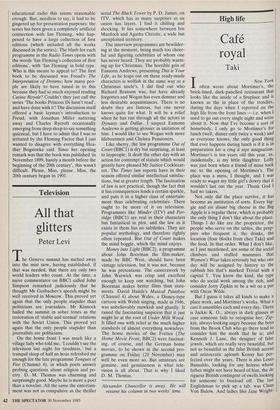Television
All that glitters
Peter Levi
The Geneva summit has melted away into the mist now, having established, if that was needed, that there are only two world leaders who count. At the time, a naive commentator on BBC1 called John Simpson remarked judiciously that he thought Mr Gorbachev's speech might be well received in Moscow. This proved yet again that the only people stupider than politicians are journalists. Mr Kinnock hailed the summit in sober tones as the restoration of 'stable and normal' relations with the Soviet Union. This proved yet again that the only people stupider than journalists are politicians.
On the home front I was much like a village lady who told me, 'I couldn't see the television last night for tiredness,' but a tranquil sleep of half an hour refreshed me enough for the late programme Tongues of Fire (Channel 4), in which poets answer probing questions about religion and po- etry. D. M. Thomas was charming and surprisingly good. Maybe he is more a poet than a novelist. All the same the entertain- ment was not as compulsive as the thriller serial The Black Tower by P. D. James, on ITV, which has as many surprises as an onion has layers. I find it chilling and shocking. It lies somewhere between Iris Murdoch and Agatha Christie, a wide but unexploited territory.
The interview programmes are bewilder- ing at the moment, being much too cheer- ful and figuring celebrities of whom one has never heard. They are probably warm- ing up for Christmas. The horrible grin of Eamonn Andrews, presenting This is Your Life, as he leaps out on these ready-made characters is wolfish in the same way as a Christmas uncle's. I did find out who Richard Branson was, but have already forgotten and Wogan has even dimmer and less desirable acquaintances. There is no doubt they are famous, but one never knows quite for what. It will be a relief when he has run through all the actors in Dynasty and Dallas. I suspect Eamonn Andrews is getting glossier in imitation of him. I would like to see Wogan with more lifeboatmen and Chelsea Pensioners.
Like sherry, the law programme Out of Court (BBC1) is dry but surprising, at least to laypeople. It dealt the other day with an action for contempt of statute which would greatly have pleased Mr Justice Cocklecar- rot. The Times law reports have in their season offered similar intellectual satisfac- tions, but at greater length. The fascination of law is not practical, though the fact that it has consequences lends a certain sparkle, and puts it in a higher class of entertain- ment than celebrating celebrities. There ought to be more of it on television. Programmes like Minder (ITV) and Por- ridge (BBC1) are real in their characters but fantastical in plot, and the law as it exists in them has no subtleties. They are popular mythology, and therefore rightly often repeated. But Out of Court makes the mind boggle, which the mind enjoys.
Money into Light (BBC2), a programme about John Boorman the film-maker, made by BBC West, should have been vintage television, but it was not, because he was pretentious. The camerawork by John Warwick was crisp and excellent enough to keep one watching, but John Boorman makes better films than state- ments. David Hands's Musical Paintbox (Channel 4) about Wales, a Disney-type cartoon with Welsh singing, made in 1946, was unbelievably mawkish and ghastly. It raised the fascinating suspicion that it just might lie at the root of Under Milk Wood. It filled one with relief at the much higher standards of almost everything nowadays. The home movies of the Forties (The Home Movie Front, BBC2) were fascinat- ing, of course, and the German home movies, to be shown in the second pro- gramme on Friday (29 November) may well be even more so. But amateurs are genuine, and genuineness is what tele- vision is all about. That is why I liked D. M. Thomas.


























































 Previous page
Previous page